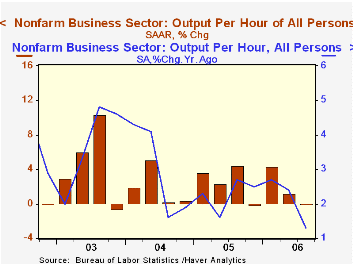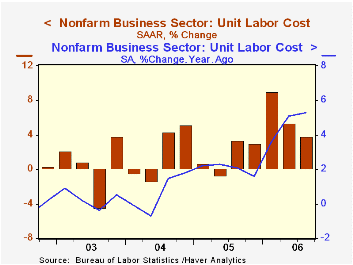 Global| Nov 02 2006
Global| Nov 02 2006U.S. Productivity Unchanged
by:Tom Moeller
|in:Economy in Brief
Summary
Non-farm labor productivity last quarter was unchanged from 2Q and the figure fell short of Consensus expectations for a 1.3% rise. While the q/q change was disappointing, similar weakness just last year was followed by recovery. This [...]

Non-farm labor productivity last quarter was unchanged from 2Q and the figure fell short of Consensus expectations for a 1.3% rise. While the q/q change was disappointing, similar weakness just last year was followed by recovery. This year, however, the y/y increase dropped to 1.3% as a result of the decline, the weakest since 1997.
The weakness fueled the growth in unit labor costs. A 3.8% gain lifted the y/y increase in costs to 5.3%, the strongest since 1990. During the last thirty years there has been an 85% correlation between labor cost growth the growth in the GDP chain price deflator, although that correlation has fallen sharply in recent years.
Compensation grew a much diminished 3.7, but here again the y/y growth remained elevated near 7%.
Factory sector productivity growth remained quite firm last quarter at 5.9% (4.3% y/y. Growth in factory sector compensation per hour slowed to 2.9% (5.1% y/y) from 4.0% during 2Q and 13.3% during 1Q and that fostered a decline in unit labor costs. The 2.9% (+0.8% y/y) decline was the first this year.
Freedom, Trade, and Growth from the Federal Reserve Bank of St. Louis can be found here
| Non-farm Business Sector (SAAR) | 3Q '06 | 2Q' 06 | Y/Y | 2005 | 2004 | 2003 |
|---|---|---|---|---|---|---|
| Output per Hour | 0.0% | 1.2% | 1.3% | 2.3% | 3.0% | 3.7% |
| Compensation per Hour | 3.7% | 6.6% | 6.7% | 4.4% | 3.6% | 4.0% |
| Unit Labor Costs | 3.8% | 5.4% | 5.3% | 2.0% | 0.6% | 0.3% |
Tom Moeller
AuthorMore in Author Profile »Prior to joining Haver Analytics in 2000, Mr. Moeller worked as the Economist at Chancellor Capital Management from 1985 to 1999. There, he developed comprehensive economic forecasts and interpreted economic data for equity and fixed income portfolio managers. Also at Chancellor, Mr. Moeller worked as an equity analyst and was responsible for researching and rating companies in the economically sensitive automobile and housing industries for investment in Chancellor’s equity portfolio. Prior to joining Chancellor, Mr. Moeller was an Economist at Citibank from 1979 to 1984. He also analyzed pricing behavior in the metals industry for the Council on Wage and Price Stability in Washington, D.C. In 1999, Mr. Moeller received the award for most accurate forecast from the Forecasters' Club of New York. From 1990 to 1992 he was President of the New York Association for Business Economists. Mr. Moeller earned an M.B.A. in Finance from Fordham University, where he graduated in 1987. He holds a Bachelor of Arts in Economics from George Washington University.
More Economy in Brief
 Global| Feb 05 2026
Global| Feb 05 2026Charts of the Week: Balanced Policy, Resilient Data and AI Narratives
by:Andrew Cates






